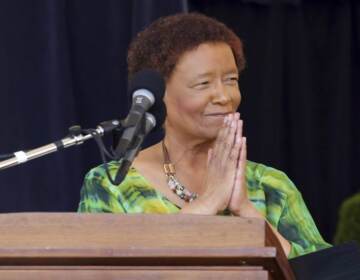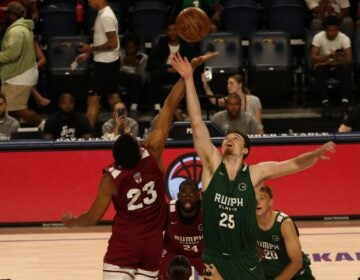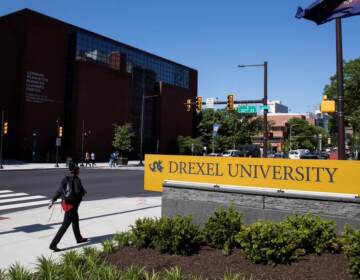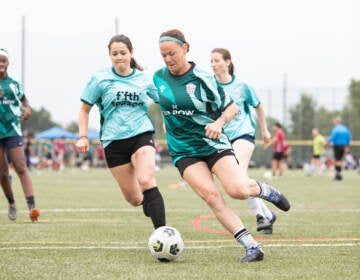U.S. Squash finds a new home in Philly with plans to create a public school league
With its large new facility at Drexel University, U.S. Squash said it plans to do community outreach to draw young people into the sport.
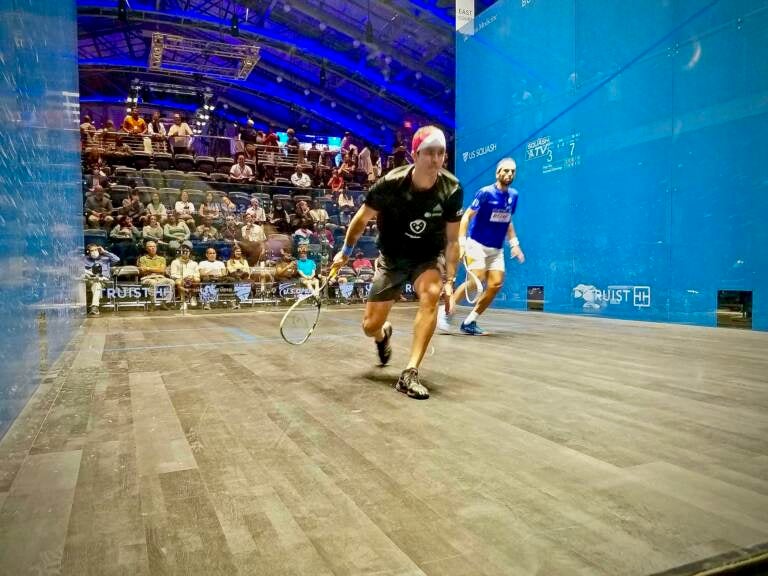
Diego Elías of Peru (in black) plays against Mohamed el Shorbagy of Egypt (in blue), in the US Open for squash at the new Arlen Spector Squash Center on the campus of Drexel University. (Peter Crimmins/WHYY)
Updated at 2:37 p.m.
The national association for squash has just established its headquarters in Philadelphia. The new home of U.S. Squash is the recently built Arlen Specter US Squash Center on the campus of Drexel University.
“If you stuck a pin on a map in the U.S. of where the ideal location would be, it would be within this neighborhood,” said president and CEO Kevin Klipstein, who moved the headquarters from New York last week.
“Philadelphia has an international airport. It’s got a global reputation. It’s a sports city. It’s also in between Boston and Washington, which is our base,” he said.
Drexel University offered U.S. Squash its Drexel Armory building at 33rd Street and Lancaster Avenue, inside of which the organization spent $35 million to build the largest squash center in the country: Its 20 courts include two doubles courts and two showcase competition courts entirely made of glass to maximize audience viewing and television camera access.
The center got its first workout this week, as professional players from around the world came to Philadelphia for the U.S. Open tournament.
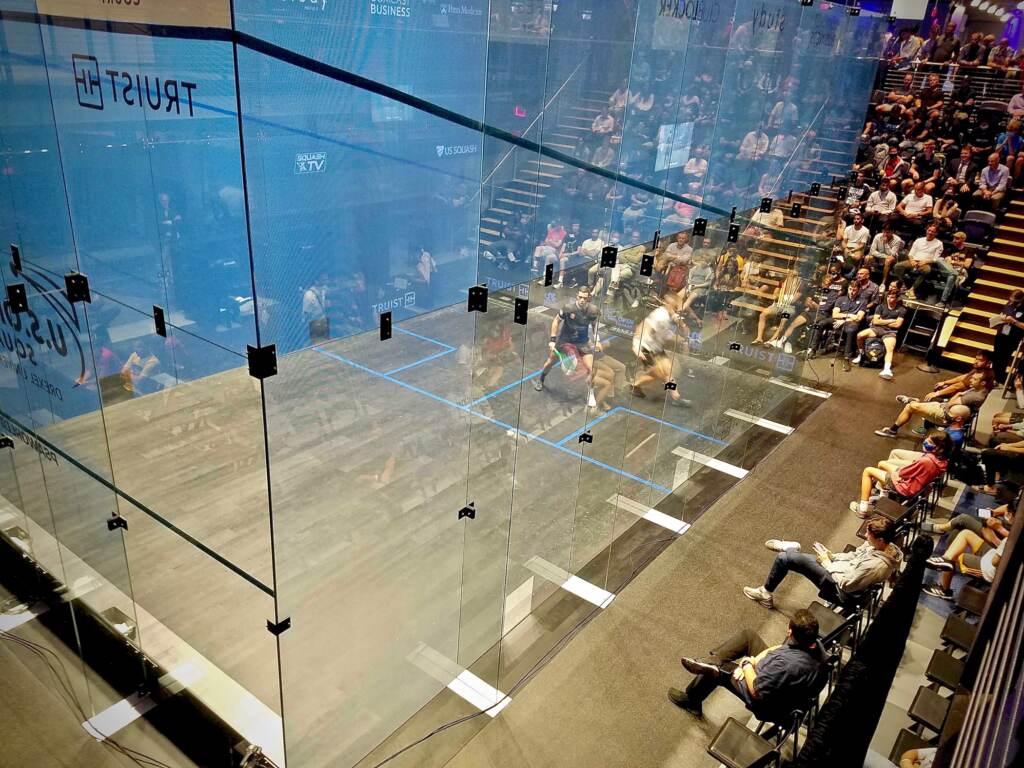
With its new facility, U.S. Squash said it plans to do community outreach to draw more young people into the sport. They will launch a public school squash league this winter in Philadelphia, with 10 boys and girls teams from area high schools.
A homecoming of sorts
The size of the new Arlen Specter Center allows U.S. Squash to focus its operations in one location. The organization holds more than 20 tournaments a year in cities across the country. For the last 10 years, Drexel has hosted the U.S. Open in its Daskalakis Athletic Center, but each year required extensive preparations to bring the U.S. Squash crew to Philadelphia in advance and to construct temporary glass courts on the gymnasium’s basketball court.
“It was a real challenge,” said Klipstein. “Instead of going to different facilities around the country and flying or driving there and setting up temporary installations and staying in hotels and buying food and supplies, we’re able to bring everybody to Philadelphia for these major events. We’ll have about a $25 million economic impact on an annual basis for this local area.”
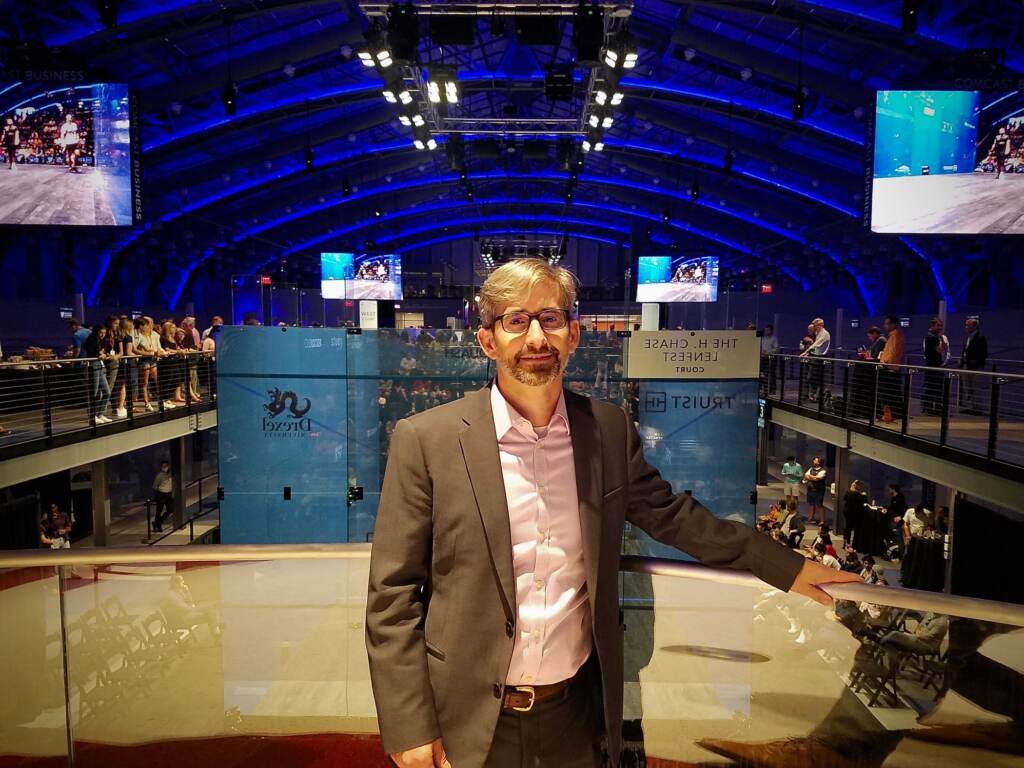
The move to Philadelphia is something of a homecoming for U.S. Squash, which was originally founded here in 1904.
The center at Drexel was named after the late U.S. Senator from Philadelphia, who was an avid squash player known to set aside an hour every day to play.
“I had the pleasure of playing with him once many years ago after he recovered from cancer treatments. He played every day for about 40 years,” said Klipstein. “He wanted to run around. He wanted to get a sweat and a little bit of locker room chat and get to know somebody. It was a real pleasure.”
Specter was not and is not the only politician to make time for squash. Former U.S. Secretary of Defense Donald Rumsfeld and Sen. Kirsten Gillibrand, for example, have both received attention for their prowess on the court. Klipstein said Specter was an unofficial ambassador for the sport as he discovered it later in life and maintained an enthusiastic playing regimen as he got older.
Plans to expand Philly squash mentorship program
Although squash is played as a league sport at the high school level, the teams are usually formed by clubs outside of school. This year’s Philadelphia high school league will serve as a model to be replicated in other cities, Klipstein said.
The Specter Center is open to the public through paid memberships costing $65 or $115 per month, and will accommodate non-members for drop-in play. Klipstein said memberships will extend to family members of its high school league players, and will have incentives to draw new players.
“For example, if you don’t have the means to afford certain components of our programming, we actually have free programming and that extends to the middle and high schools,” he said.
As part of its community outreach efforts, U.S. Squash has also brought SquashSmarts under its roof. The 20-year-old after-school athletic and academic mentoring program is expanding its West Philly and North Philly operations with dedicated office and teaching spaces inside the Specter Center.
The arrangement is mutual: U.S. Squash is not charging SquashSmarts rent to be a tenant in the building, and SquashSmarts is assisting U.S. Squash on designing programming for young people at the center.
SquashSmarts introduces squash to students at partnering Philadelphia public schools. There, it recruits interested children to sign up for regular, year-round sessions, wherein they are shuttled to a nearby squash facility for coaching, mentoring, and academic assistance. The program currently serves 369 students, with plans to more than double that by next year.
“We like to say that we’re an inch wide and a mile deep. We’re not necessarily working with the most number of kids, but we’re trying to work with them as frequently as possible,” said CEO Stephen Gregg.
For some, a love of squash did not come easily. Squash is statistically less popular than its closest cousin, racquetball, which has about twice the number of players in the U.S. Although U.S. Squash sits on the International Olympic Committee, squash has not been accepted as an Olympic sport.
However, a recent rise in squash’s popularity is dramatic, with the number of players tripling in the last 15 years. Yet, in many Philadelphia neighborhoods, squash remains relatively unknown.
“I played baseball before. Squash is completely different,” said Joshua Morales, a former SquashSmarts student, who is now a staff member at the program. “You have to have that hand-eye coordination, but squash is more cardiovascular. You have to be able to run low, get high, move side-to-side. It’s super different.”
“When I first heard about squash, I didn’t want to join,” said Kareem Price, another SquashSmarts staffer, who had been a competitive player in the middle and high school program. “My sixth grade teacher and my mom had a conversation. My mom forced me to come back.”
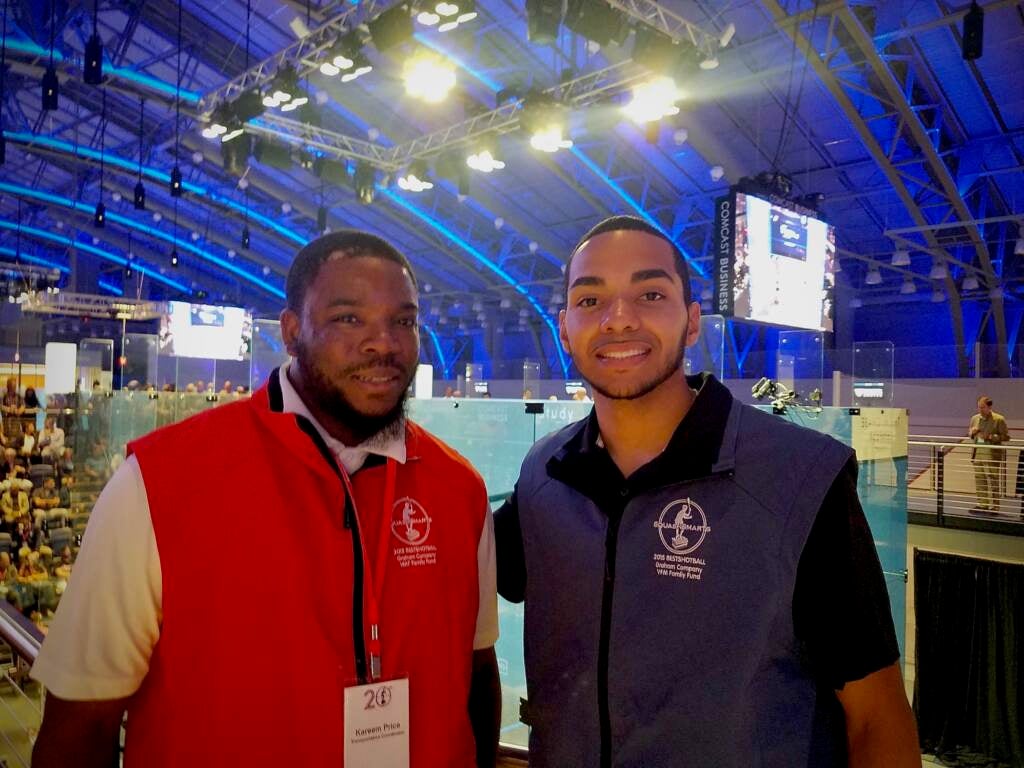
“Once I started actually doing it, it was pretty cool. I saw that I was good at it,” he said while attending the recent U.S. Open. “Not to toot my own horn — I’m not like none of these pros that we are around now — but I think I had a good squash career. I didn’t play in college, I did different sports in college. But it helped me get through some of the toughest times in my life.”
Price lost his father at a young age to gun violence, and said he often felt angry. Squash helped him work through his emotions, while keeping his academic life on track.
“We’re hitting a ball against a wall. You literally could get all the frustration out of you right there,” he said. “It helped me just being around good friends, good mentors, having good teachers, and squash coaches.”
As a tenant of the Specter Center, SquashSmarts plans to expand its programming to younger children, putting racquets for the first time in the hands of kindergartners and elementary school students.
Correction: An earlier version of this story implied there were no already existing public school squash leagues in the United States.

Get daily updates from WHYY News!
WHYY is your source for fact-based, in-depth journalism and information. As a nonprofit organization, we rely on financial support from readers like you. Please give today.



